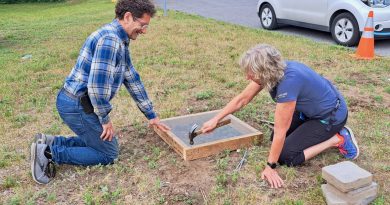Nov. 23 COVID-19 update: Ottawa numbers, province looks to keep chief, third vaccine promising
Special to WC Online
OTTAWA – Ottawa Public Health (OPH) is reporting one COVID-19-related death and 40 new cases in the city today (Nov. 23), and reports its active case count has dropped below 350.
Of the 27 ongoing outbreaks at local institutions, seven of the retirement and long-term care facilities continue to report deaths due to COVID-19. Ottawa’s death toll has reached 367, as of Monday, Nov. 23.
No new outbreaks are being reported today. There are three current community outbreaks; one is linked to a social gathering, another is connected with a community organization, while the third stems from a workplace.
Active cases of COVID-19 in the city are down to 347. Hospitalizations because of the novel coronavirus are down to 30, with just two patients in intensive care.
There have been 8,212 lab-confirmed cases of COVID-19 in Ottawa since March, and of those, 7,498 have been resolved.
Province looks to keep chief medical officer of health
ONTARIO – The Ford government wants Dr. David Williams to put off retirement a little longer.
Today (Nov. 23), provincial officials filed a motion seeking to extend the term of Ontario’s chief medical officer of health.
Williams was set to retire sometime in February 2021.
“I am very pleased to announce that in response to a request from government, Dr. David Williams has agreed to stay on as Ontario’s Chief Medical Officer of Health,” Minister of Health Christine Elliott released in a statement. “This morning we tabled a motion to re-appoint Dr. Williams. Should the motion be passed, Dr. Williams will be re-appointed commencing Feb. 16, 2021 up until Sept. 1, 2021.”
Premier Doug Ford says he relies heavily on Williams’ advice when it comes to making health and safety decisions, such as enforcing restrictions and lockdown measures across the province.
Williams came under fire last week after he suggested Ontario could return to the province’s ‘Green Zone’ by Christmas. Dr. Michael Warner, head of critical care at Michael Garron Hospital, quickly took to social media disputing that claim, calling it “impossible.”
Elliott later attempted to clarify, saying Williams “is being very optimistic but that is in his nature.”
“In his role as Chief Medical Officer of Health, Williams worked closely with our federal and provincial partners as a member of the Special Advisory Committee on COVID-19, as well as continuing to consult with Ontario’s local medical officers of health,” Elliott said. “These collaborations have allowed Dr. Williams to establish and strengthen relationships with our partners as we work collectively to defeat this virus. .Most recently, Dr. Williams took a leading role in the development of the Keeping Ontario Safe and Open Framework, introducing preventative measures earlier to help avoid broader closures and allow for additional public health and workplace safety measures to be introduced or removed incrementally.”
Modelling data released in early November suggests we could hit 6,500 cases a day by mid-December
Third pharmaceutical company produces positive COVID-19 vaccine results
CANADA – AstraZeneca says it is in the late stage trials of a COVID-19 vaccine it says has been H\highly effective.”
The results are based on interim analysis of trials in the United Kingdom and Brazil of a vaccine developed by Oxford University and manufactured by AstraZeneca. No hospitalizations or severe cases of COVID-19 were reported in those receiving the vaccine.
“These findings show we have an effective vaccine that will save many lives,” Oxford University Professor Andrew Pollard, chief investigator for the trial, released in a statement. “Excitingly, we’ve found that one of our dosing regimens may be around 90 per cent effective.”
AstraZeneca is the third major drug company to report late-stage results for its potential COVID-19 vaccine as the world anxiously waits for vaccines that will end the pandemic that has killed almost 1.4 million people. Pfizer and Moderna last week reported preliminary results from late-stage trials showing their vaccines were almost 95 per cent effective.
Unlike the Pfizer and Moderna vaccines, the Oxford-AstraZeneca candidate doesn’t have to be stored at ultra-cold temperatures, making it easier to distribute, especially in developing countries. All three vaccines must be approved by regulators before they can be widely distributed.
“The Oxford vaccine can be stored in the fridge, as opposed to the freezer like the other two vaccines, which means it is a more practical solution for use worldwide,” Peter Horby, professor of Emerging Infectious Diseases and Global Health at Oxford, said.
The results come as a second wave of COVID-19 hits many countries, once again shutting businesses, restricting social interaction and pummeling the world economy.
AstraZeneca said it will immediately apply for early approval of the vaccine when possible, and it will seek an emergency use listing from the World Health Organization, so it can make the vaccine available in low-income countries.
The AstraZeneca trial looked at two different dosing regimens. A half-dose of the vaccine followed by a full dose at least one month later was 90 per cent effective. Another approach, giving patients two full doses one month apart, was 62 per cent effective. The combined results showed an average efficacy rate of 70 per cent.
The vaccine uses a weakened version of a common cold virus combined with genetic material for the characteristic spike protein of the virus that causes COVID-19. After vaccination, the spike protein primes the immune system to attack the virus if it later infects the body.
The vaccine can be transported under “normal refrigerated conditions” of two to eight degrees Celsius (36-46 degrees Fahrenheit), AstraZeneca said. By comparison, Pfizer plans to distribute its vaccine using specially designed “thermal shippers” that use dry ice to maintain temperatures of minus-70 degrees Celsius (minus-94 degrees Fahrenheit).
Peter Openshaw, professor of experimental medicine at Imperial College London, said the finding that a smaller initial dose is more effective than a larger one is good news because it may reduce costs and mean more people can be vaccinated.
“The report that an initial half-dose is better than a full dose seems counterintuitive for those of us thinking of vaccines as normal drugs: With drugs, we expect that higher doses have bigger effects, and more side-effects,” he said. “But the immune system does not work like that.”
The results reported today (Nov. 23) come from trials in the U.K. and Brazil that involved 23,000 people. Late-stage trials are also underway in the U.S., Japan, Russia, South Africa, Kenya and Latin America, with further trials planned for other European and Asian countries.
AstraZeneca has been ramping up manufacturing capacity, so it can supply hundreds of millions of doses of the vaccine starting in January, chief executive Pascal Soriot said earlier this month.
Soriot said Monday the Oxford vaccine’s simpler supply chain and AstraZeneca’s commitment to provide it on a non-profit basis during the pandemic mean it will be affordable and available to people around the world.
“This vaccine’s efficacy and safety confirm that it will be highly effective against COVID-19 and will have an immediate impact on this public health emergency,” Soriot said.
British Health Secretary Matt Hancock said he felt “a great sense of relief” at the news from AstraZeneca.
Britain has ordered 100 million doses of the Oxford vaccine, and the government says several million doses can be produced before the end of the year if it is approved by regulators.
Just months ago, “the idea that by November we would have three vaccines, all of which have got high effectiveness … I would have given my eye teeth for,” Hancock said.











